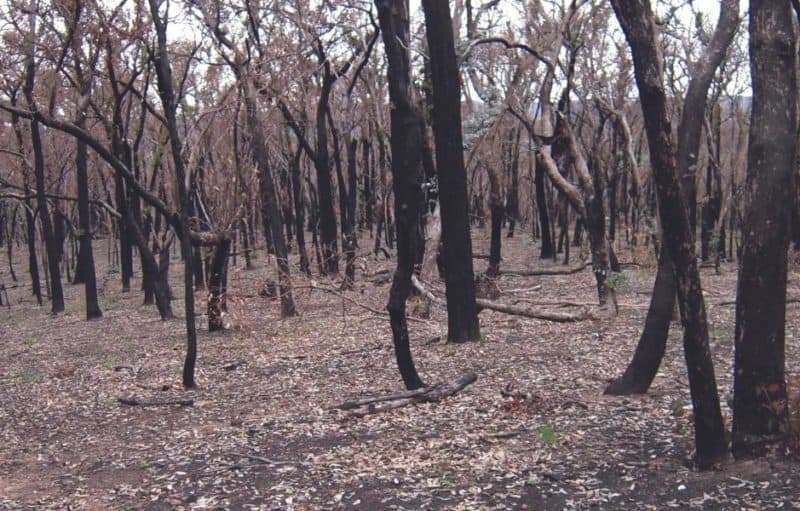PARK WATCH June 2021 |
The Victorian Government is now conducting a Major Event Review on the impact the 2019-20 bushfires had on native forests and the logging industry.
It’s hard to forget the intensity and unprecedented scale of the Black Summer fires. The impact on lives, homes, landscapes and wildlife is still difficult to comprehend. Many of the ecological consequences of the fires aren’t yet understood.
Across Victoria, 1.25 million hectares burnt, including 18 per cent of our public native forests. There is a clear need for a reassessment of native forests across the whole state, as unburnt areas are now critical for the survival of a range of forest-dependent species.
In 2020, VNPA and East Gippsland community forest groups undertook an analysis of the impact of the fires, and the added burden of native forest logging on key unburnt areas. The findings were published in our report After The Fires: Protecting Our Forest Refuges (see vnpa.org.au/after-the-fires-report). We discovered 553 coupes covering over 20,000 hectares of forest are planned for logging in the coming months to years by VicForests in East Gippsland.
This is the first Major Event Review to be conducted jointly by the Victorian and the Commonwealth governments after the process was introduced with the renewed Regional Forests Agreements in 2020. A review is triggered by a destructive event such as bushfires, floods, diseases or other large significant changes to the forests estate. A key objective of a Major Event Review is to figure out how the impact of events affects the Regional Forest Agreements, the long-term plans for managing native forest logging in our state.
It involves a public consultation and an independent panel consisting of Victorian Commissioner for Environmental Sustainability, Dr Gillian Sparkes; Ms Katherine Mullett, a proud Gunaikurnai, Ngarigo Monero woman who has a decade of experience in Cultural Heritage Management and Land Management; and forester Dr Tony Bartlett.
It aims to identify environmental, economic, social and cultural values impacted by the fires and if remedial actions need to be undertaken. However, the recommendations will be non-binding, and importantly, the outcomes will not result in the Regional Forests Agreements being renegotiated or changed.
The loss of native vegetation and wildlife, followed by predation from invasive cats and foxes, browsing by pest herbivores like deer, and an influx of weeds in disturbed areas pose an immediate threat to native plants and animals in the aftermath of fire.
We believe the Major Event Review must not underestimate the importance of protecting – that is, not logging – unburnt forest and wildlife refuge areas for their recovery and resilience to future major events.
In our submission to the review we identified, as a starting point, ten key issues that should be focused on:
- Assessing implications of climate change and fires on forests
- Impact on threatened species and communities
- Impact on the reserve system
- Impact on old growth
- Impact on ash forests
- Impact of salvage and post-disturbance logging
- Impact on logging yield
- Improved forest management post-fire
- Protection of unburnt forest refuges
- Protection of large old trees
Read our detailed submission at vnpa.org.au/submission-major-event-review
Did you like reading this article? Want to be kept up to date about this and other nature issues in Victoria? Subscribe to our email updates.
You can also receive our print magazine Park Watch four times a year by becoming a member. Find out more here.
